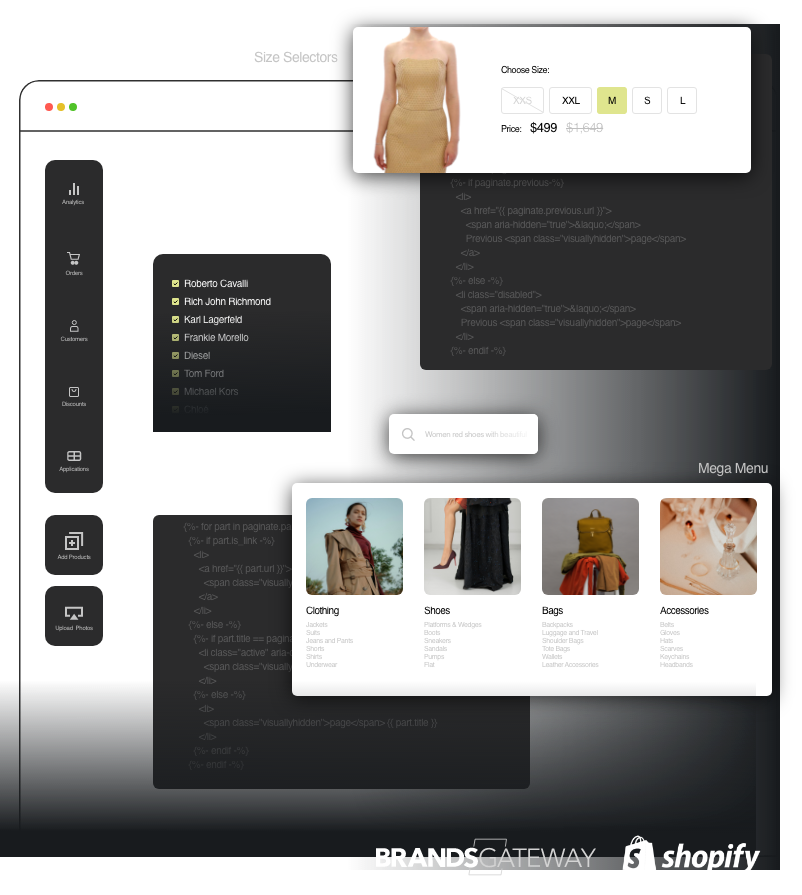In the world of e-commerce, choosing the right payment gateway is crucial for a good customer experience. Shopify Payment gateways are tools that help online stores process payments securely and efficiently. They act as a middleman between the store owner and the banks or credit card companies involved in the transaction.
Shopify has its own payment solution called Shopify Payments, which is designed to work seamlessly with their platform. On the other hand, there are many Third-Party Payment Gateways available, each with its own features that cater to different types of businesses. Some popular examples include PayPal, Stripe, Square, Authorize.net, and Braintree.
This article compares the Pros and Cons of Shopify Payments vs. Third-Party Payment Gateways. We’ll explore their strengths and weaknesses in detail, giving you the information you need to make an informed decision. Whether you’re just starting out or looking to switch providers, this guide will help you find the best payment processing option for your business.
Understanding Shopify Payments
Shopify Payments is the proprietary payment processing platform for Shopify users, designed to integrate directly with your store. By setting up Shopify Payments, merchants can accept credit card payments and other forms of payments without involving third-party gateways.
Pros of Shopify Payments:
- Seamless Integration: It syncs perfectly with your Shopify store, providing a streamlined experience for both the merchant and customers.
- Hassle-Free Setup: Getting started with Shopify Payments is straightforward, often requiring just a few clicks within the Shopify dashboard.
- No Transaction Fees: Unlike using external gateways, Shopify Payments waives the additional transaction fees that would otherwise be incurred.
- Simplified Payouts: Earnings are deposited directly into a merchant’s bank account, often within a few days.
Cons of Shopify Payments:
- Restricted Payment Options and Geographic Coverage: The service isn’t available in all countries and may not support all local payment methods which could limit sales opportunities.
- Risk of Account Holds/Shutdowns: There have been instances where accounts are temporarily held or even shut down due to various issues such as chargebacks or suspected fraudulent activity.
Merchants can mitigate these risks by maintaining clear transaction records, providing excellent customer service to reduce disputes, and understanding the terms of service to remain compliant with Shopify’s policies.
A case study by an online apparel retailer showcased significant savings on transaction fees after switching to Shopify Payments. This shift positively impacted their bottom line and allowed them to reinvest in marketing efforts to drive additional sales.
By weighing these pros and cons, you can determine if Shopify Payments aligns with your business needs and whether its benefits outweigh its limitations.
Exploring Third-Party Payment Gateways for Shopify
While Shopify Payments offers a seamless and convenient solution, there are other alternatives available. The Third-Party Payment Gateways come with their own set of pros and cons, offering unique features that may better suit your business needs.
-
PayPal
A name synonymous with online transactions, PayPal is a major player in the e-commerce industry. With Shopify, integrating PayPal as a payment gateway is straightforward.
Pros of using PayPal with Shopify:
- Large User Base: PayPal boasts a user base of over 200 million users as of 2023. This means that many of your customers likely already have a PayPal account and trust its services.
- Reputation for Security: PayPal’s stringent security measures are well documented. Customers often feel safer using PayPal due to their buyer protection policy.
- Diverse Payment Options: From credit cards to bank transfers to PayPal balance, it offers multiple ways for customers to pay.
Cons of using PayPal with Shopify:
- Additional Transaction Fees: In addition to the fees charged by Shopify, you’ll have to pay transaction fees to PayPal as well. This can eat into your profit margins.
- Potential for Disputes: While customer protection is generally a good thing, it can sometimes work against sellers. Customers can initiate disputes or chargebacks on transactions, which can be time-consuming and costly to resolve.
With its established reputation and wide acceptance among customers, PayPal can be an advantageous addition to your Shopify store despite the additional transaction fees and potential for customer disputes.
Stripe with Shopify
Stripe is a popular choice for Shopify store owners who want more control over their payment process and a better checkout experience. With Stripe, you can access a wide range of features and customize your checkout page to match your brand. However, there are also some things to consider before deciding if Stripe is right for your business:
Pros:
- Advanced Feature Set: Stripe offers many modern features like support for recurring payments, one-click checkout, and real-time analytics.
- Customizable Checkout: You can personalize the checkout experience to fit your store’s design, which may help reduce cart abandonment and improve user satisfaction.
- Fraud Prevention Tools: Stripe provides tools to detect and prevent fraudulent transactions, giving you added security for your business.
Cons:
- Technical Integration: Setting up advanced features in Stripe might require some technical knowledge or hiring a developer.
- Risk Management: While fraud prevention tools are important, they need to be properly configured to avoid blocking legitimate customers.
As a Shopify merchant, it’s important to think about these factors and decide if Stripe matches your e-commerce goals and technical abilities. Consider the benefits of customization and feature-rich services versus the practicality of integration and ongoing risk management.
Square, Authorize.net, and Braintree
When considering Third-Party Payment Gateways for your Shopify store, it’s important to look at popular options like Square, Authorize.net, and Braintree. Each of these gateways offers unique benefits and could be the right choice depending on your specific needs.

Square with Shopify
- Known for its user-friendly interface, Square is particularly beneficial for merchants with physical stores as well as online operations. The system allows for seamless integration between in-person and online sales.
- For international merchants, Square’s features are somewhat limited outside the United States, Canada, Australia, and the UK.
- Square supports a variety of payment methods including credit cards, Google Pay, and Apple Pay.
- While it excels in supported regions, global expansion is restricted.
Authorize.net with Shopify
- With a strong emphasis on security, Authorize.net is a robust gateway that accepts electronic checks and credit card payments. It’s also famous for excellent fraud protection services.
- It may be considered less intuitive than some alternatives and typically involves a setup fee alongside monthly charges.
- net offers multiple payment solutions including digital payment options which are increasingly popular.
Braintree with Shopify
- A PayPal service, Braintree allows businesses to process payments from all over the world including PayPal transactions. This gives it an edge in global commerce applications.
- Integration can be complex and may require more technical expertise than other options. While transaction fees are competitive, costs can accumulate when using additional features.
- Its extensive international support makes Braintree ideal for stores with a global customer base.
Each gateway has its own set of advantages that could enhance your store’s checkout experience and cater to different customer preferences. When selecting a gateway, consider factors like the technical ease of integration with Shopify, potential fees involved, and the geographic reach that matches your business ambitions.
Making the Right Choice for Your Shopify Store
When deciding between Shopify Payments and Third-Party Payment Gateways, several critical factors must be taken into account to ensure the best fit for your online store. These considerations will guide you towards a payment solution that aligns with your current operations and future aspirations.
Key Factors to Consider
- Transaction Fees: Analyze the costs associated with each payment method. While Shopify Payments waives transaction fees, third-party gateways may offer lower credit card rates.
- Flexibility: Determine if you need a platform that supports multiple currencies or one that can integrate with other apps and services you use.
- Security: Ensure the chosen gateway upholds high-security standards to protect your customers’ data.
- Scalability: Consider if the payment gateway can handle increased transactions as your business grows.
Evaluating Business Needs and Goals
Assess your business model and target market. If your customers prefer a particular payment method or if you serve an international audience, a third-party gateway with diverse options might be more suitable.
Smooth Implementation and Checkout Optimization Tips
- Test different payment methods to find the most user-friendly option for your customers.
- Simplify the checkout process to minimize cart abandonment.
- Stay informed about new features and updates from payment providers that could enhance customer experience.
By thoroughly evaluating these aspects, you can choose a payment processing solution that not only meets your immediate needs but also supports your store’s long-term success.
The Best of Both Worlds: Using Multiple Payment Options
A key strategy to improve your Shopify store’s conversion rates and build customer trust revolves around the implementation of Multiple Payment Options. It’s no secret that customers appreciate choice, especially when it comes to how they spend their money.
So, why not give them just that? Here are a few reasons:
- Customer Convenience: Some customers prefer PayPal, while others may incline towards Stripe or even direct bank transfers. Offering a variety of payment methods caters to these preferences, providing a more convenient shopping experience.
- Increased Trust: Familiarity breeds trust. When customers see familiar payment methods in your store, they are likely to feel more secure about completing their purchase.
- Improved Conversion Rates: By reducing barriers at the checkout stage, you increase the likelihood of customers completing their purchase. A range of payment options can help reduce cart abandonment rates.
Remember, it’s all about catering to your customer’s comfort and convenience. By offering multiple payment options on your Shopify store, you are taking a significant step towards achieving this goal.
Conclusion
When it comes to building an online store that is both beautiful and highly functional, Liv Theme stands out as a top choice. Most consider it as the best pre-built Shopify store option, offering numerous benefits for your business:
- Professional Design: Liv Theme features a sleek and contemporary design that ensures your online store looks polished and trustworthy, ultimately boosting your brand’s credibility.
- Mobile Responsiveness: As more and more people shop on their mobile devices, having a theme that adapts seamlessly to different screen sizes is crucial. Liv Theme excels in this aspect, providing an excellent user experience across various devices.
But Liv Theme goes beyond just appearances. It serves as a foundation for creating a visually appealing online store with optimizations to drive sales and enhance customer satisfaction. In other words, it’s not just a pretty face – it’s a powerful tool for growing your business.
So why wait? Unlock the potential of Liv Theme and give your Shopify Store the upgrade it deserves! Remember, building a successful online business starts with choosing the right platform.
